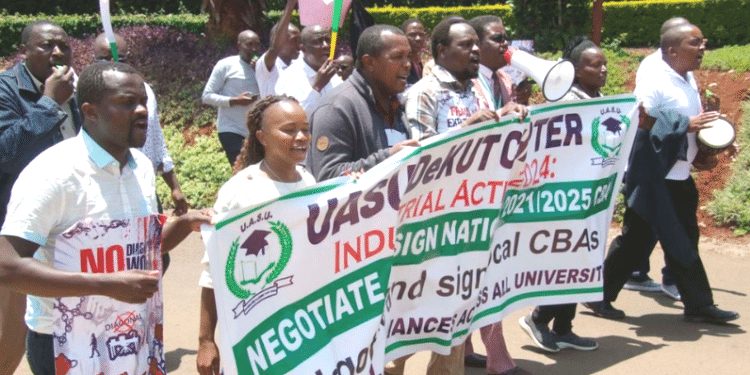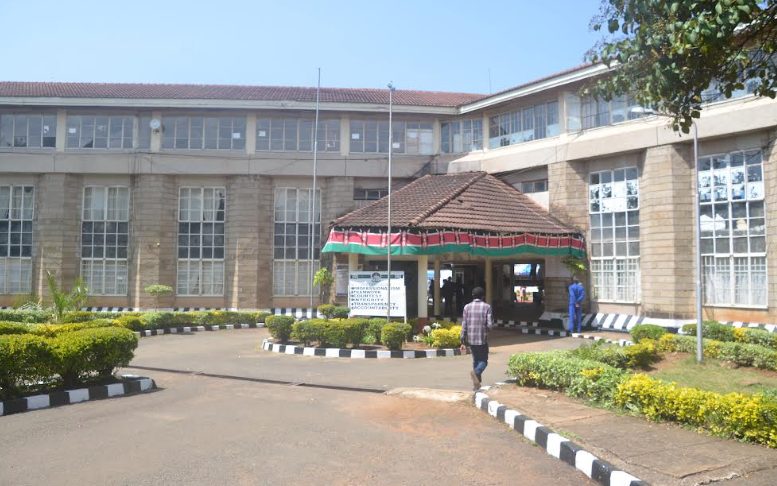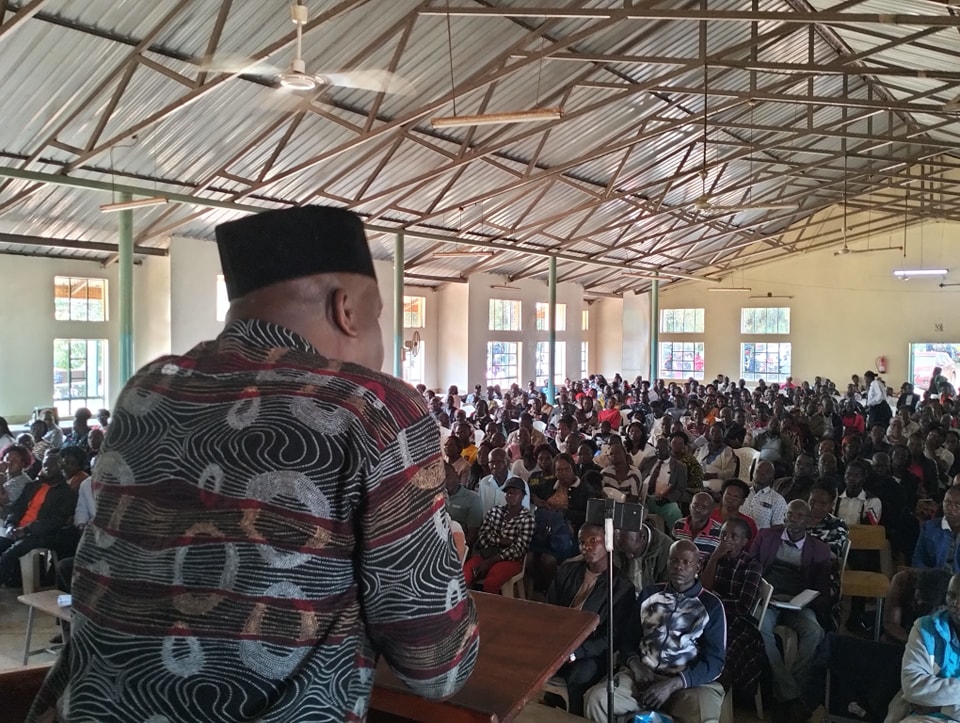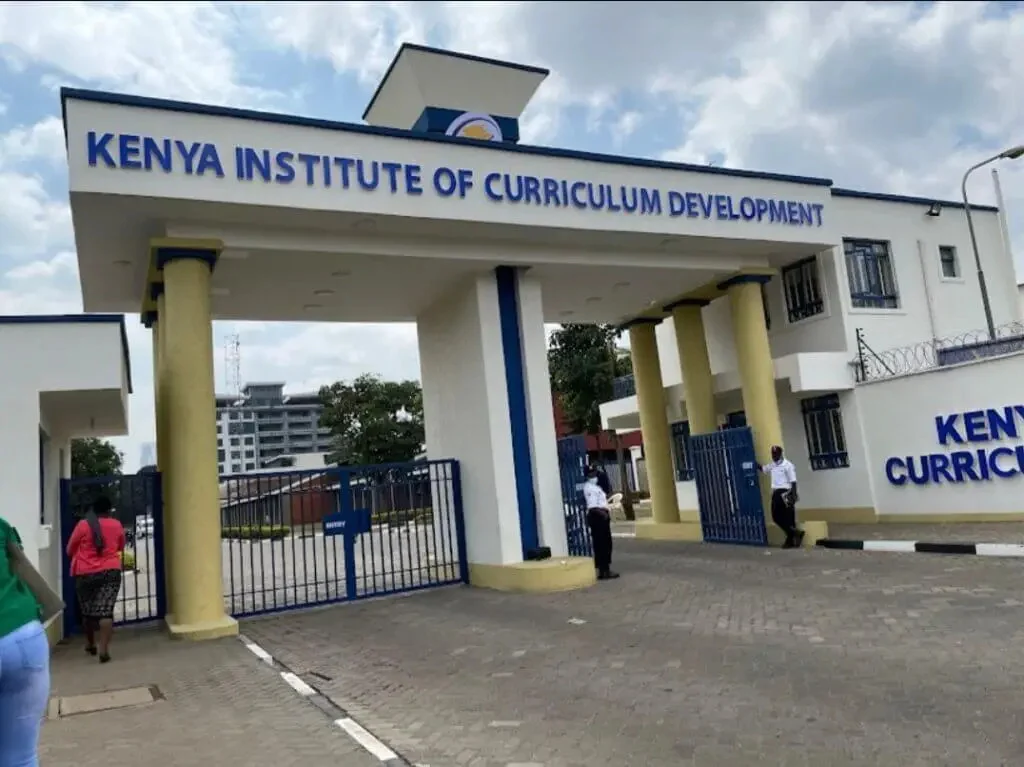A joint technical audit committee has faulted the Salaries and Remuneration Commission (SRC) for adopting an erroneous computation model in the implementation of the 2017–2021 Collective Bargaining Agreements (CBAs).
This error shortchanged thousands of university employees and sparked prolonged industrial unrest across Kenya’s public universities.
The findings are contained in the Audit Report on the Implementation of the 2017–2021 CBAs, adopted during a plenary session of the Joint Negotiations Committee (JNC) held in Machakos on October 13, 2025.
The Machakos meeting of the Joint Negotiations Committee (JNC), held on 13th October 2025, brought together a full panel of representatives from universities, unions, and government agencies.
The session was chaired by Prof. Romanus Odhiambo, who presided over the deliberations alongside Mr Odoyo Genga, the Co-Chairperson representing the Inter-Public Universities Councils Consultative Forum (IPUCCF).
Also present were Dr Charles Mukhwaya, Secretary-General of the Kenya Universities Staff Union (KUSU); Mr Albert Njeru, Secretary-General of the Kenya Union of Domestic, Hotels, Educational Institutions, Hospitals and Allied Workers (KUDHEIHA); and Mr George Juma, who served as the Joint Secretary of the JNC Secretariat. Dr Grace Nyongesa represented the Ministry of Education (University Education and Research), while Mr Eric Bosire attended on behalf of the National Treasury. Mr Justus Musyoka represented the Salaries and Remuneration Commission (SRC).
From the IPUCCF, the meeting was attended by Prof. Emily Akuno, Vice-Chairperson, and Prof. Erastus Njoka, both of whom participated in the financial verification discussions. Members of the JNC Technical Committee present included Dr Daniel Ojwang and Dr Peter Waweru, with Mr Fredrick Kinyua representing the JNC Secretariat. Ms Ruth Adhiambo, who served as the recording secretary, documented the proceedings.
At the same time, Mr Joel Kibet, an administrative officer from the IPUCCF Secretariat, provided administrative and logistical support throughout the meeting.
The gathering convened as a validation and adoption session of the JNC Technical Audit Report on the implementation of the 2017–2021 CBAs for public universities being culmination of months of technical review and financial verification aimed at reconciling salary arrears. These arrears arose from the protracted dispute between universities, unions, and government agencies over the correct computation model and total cost of implementing the CBA.
It sought to confirm and adopt the verified financial findings formally, harmonise interpretations of salary structures across institutions, and approve the final audit report as the official record of outstanding obligations.
“CSR adopted the horizontal computation method contrary to the Employment and Labour Relations Court’s determination of January 28, 2021, which upheld the diagonal progression model as the lawful approach,” reads the report.
The committee found that by applying the horizontal method, the SRC had effectively denied university staff their cumulative annual increments over the four years covered by the CBAs, leading to a substantial underpayment.
“The horizontal model limits salary progression to static increments within the same band and does not recognise annual movement across grades. This resulted in a distortion of pay structures and underpayment of workers,” the audit observed.
The audit discredited the SRC’s earlier conclusion that only Sh624 million remained outstanding, terming it invalid, misleading, and contrary to verified financial records.
“The figure of Sh624,000,000 advanced by the SRC was found to be inconsistent with verified payroll data. The correct residual obligation stands at Sh7,774,000,000 as of October 2025,” the report stated.
The JNC’s verification exercise placed the total financial requirement for full implementation of the 2017–2021 CBAs at Sh16.57 billion, far exceeding the SRC’s initial estimates. It further emphasised that the commission’s miscalculations directly contributed to the erosion of industrial harmony in public universities.
“The SRC’s deviation from the approved model undermined industrial peace and disrupted the principle of good faith in collective bargaining,” the report noted.
The audit faulted SRC for failing to consult the JNC and IPUCCF before issuing its advisory to universities. It described the unilateral computation approach as a breach of inter-agency coordination and an impediment to transparent wage implementation.
“The absence of inter-institutional consultation led to misinterpretation and misapplication of the CBAs. Going forward, SRC advisories on university remuneration should be validated through the JNC to ensure accuracy and compliance,” the committee recommended.
The report further established that the commission’s approach contradicted an existing Employment and Labour Relations Court order. Therefore, its implementation lacked legal standing.
“Any computation contrary to judicial determination is null and void. The SRC must align its advisories with binding court decisions,” the audit warned.
The committee’s members, drawn from both union and management sides, fully endorsed a recommendation for the National Treasury to release the outstanding Sh7.774 billion and for future CBAs to be executed under clear legal and procedural guidelines.
“All future CBA implementations shall adhere strictly to judicial precedent and verified financial models to prevent recurrence of similar disputes.
READ ALSO:
Family feud erupts as High Court revokes lecturer’s control over Sh200 million estate
The audit findings came at a time when public universities areab grappling with a nationwide strike by academic and non-teaching staff, which began in September 2025.
The report acknowledged that the ongoing strike was a direct consequence of SRC’s missteps. It urged prompt action to restore industrial harmony.
“The industrial unrest currently experienced in universities is an outcome of prolonged non-compliance and miscalculation by the implementing agencies,” the committee observed.
It added that resolving the dispute required transparent coordination among all government departments involved in university remuneration.
“Restoration of trust among stakeholders will depend on the government’s willingness to rectify the errors identified by this audit and to honour its financial obligations,” the report emphasised.
The committee also recommended that the Ministry of Education establish an oversight mechanism to monitor SRC compliance with court directives in all future salary reviews.
“A joint oversight framework should be institutionalised to monitor adherence to judicial rulings, SRC advisories, and university council actions,” the report proposed.
JNC reaffirmed its collective commitment to ensuring fairness, accuracy, and transparency in the administration of staff remuneration across Kenya’s public universities.
“This audit represents an institutional awakening that accountability and lawful computation are indispensable pillars of sustainable industrial relations,” the report stated in its closing remarks.
By Joseph Mambili
You can also follow our social media pages on Twitter: Education News KE and Facebook: Education News Newspaper for timely updates.
>>> Click here to stay up-to-date with trending regional stories
>>> Click here to read more informed opinions on the country’s education landscape






